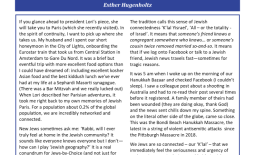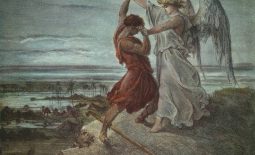Pride Sermonette
The story of the Ten Spies versus Joshua and Caleb has become paradigmatic for Jewish self-understanding. To recap briefly: Moses and the Israelites have been wandering through the wilderness and have arrived at the edge of the Promised Land. Moses sends (which is why the portion is called ‘Sh’lach Lecha’) twelve men to explore the land that lies before them and bring back reports. Ten of the twelve emissaries bring back negative, catastrophizing reports: the land, though abundant, is filled with dangers and giants.
We often focus on these ten individuals. The Torah is already deeply disappointed in them and the consequences that follow are swift: the entire people become demoralized and the project of exploration collapses.
But how about the two who held true? Joshua and Caleb? We know, of course, what happens to Joshua ultimately. He becomes the successor to Moses, helping the Israelites enter the land after Moses’ death. So his career progress is assured.
However, I am less interested in his career and more in his qualities, and what we can learn from these qualities when we think about queer liberation (with your permission, I am using queer as shorthand for the LGBTQ+ experience). A short sermonette is not enough time to delve into the fullness of Joshua’s and Caleb’s characters, but I want to extract a few particular points from the narrative:
- They saw things clear-eyed: both the opportunities (Huge grapes! Milk and honey!) and the threats (Giants! Warriors!). They did not obfuscate the threats but neither did they catastrophize them. As we see real threats to our own queer family emerge in America today, it is important to see them clear-eyed. Huge progress has been made. A culture shift has happened in this society across the last decade since Marriage Equality passed. And, at the same time, we are also facing real rollbacks. How do we balance both opportunities and threats in a way that is productive rather than paralyzing?
- They had an abundance mindset: often, social change and personal transformation is stymied by a scarcity mindset, or the false dichotomy that we only have bandwidth for one thing and not many. The lush description of the Land given in the Portion is less about riches and more about abundance. There is enough for everyone; we can be in solidarity with each other. Our rights and our liberation is not a pie. The ‘Promised Land’ – however we apply that metaphor – is not a pie. Holding on to an abundance mindset allowed Joshua and Caleb to see new possibilities and welcome new patterns of thought. Queering our own experience, even for people who don’t necessarily identify as queer can be a way to expand an abundant way of thinking that is transformative.
- They had ‘ometz lev’: they were, as some translations have, ‘of strength and good courage.’ Today, we could translate that as ‘Pride’. They had inner resolve, dignity, strength and resilience. I am always reminded of the word ‘kommemiyot’ – a hapax legomenon, otherwise known as ‘a word that only appears once’ (in this case, in the Biblical text). We see that word also in our liturgy, right before the Sh’ma. What does it mean for us to be ‘kommemiyot l’artzeinu’ – to be ‘upright’ as we are brought to our Promised Land? Joshua and Caleb embodied those qualities and so can we. We cannot control how others react to us. For that, we need collective action and social wisdom, and most of all, support and solidarity. But Joshua and Caleb can unlock inner qualities that may make our presence in the world a bit more solid, a bit more proud and a bit more resilient. We need those inner resources more than ever.
In short, Sh’lach Lecha encourages us to root ourselves in our strength, in our vision and in our abundance. These are lessons for the ages; and I pray that the wisdom of the past will bless a liberatory future for us all. Chazak v’amatz, dear ones!




